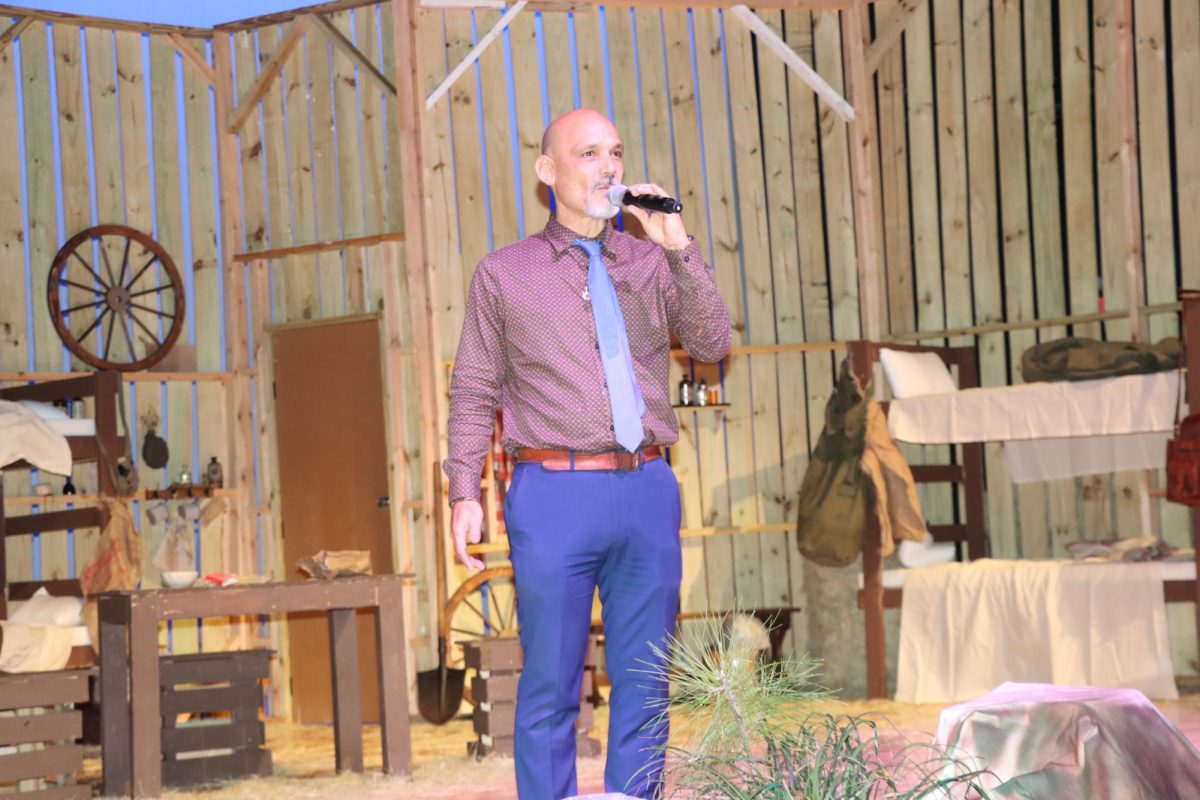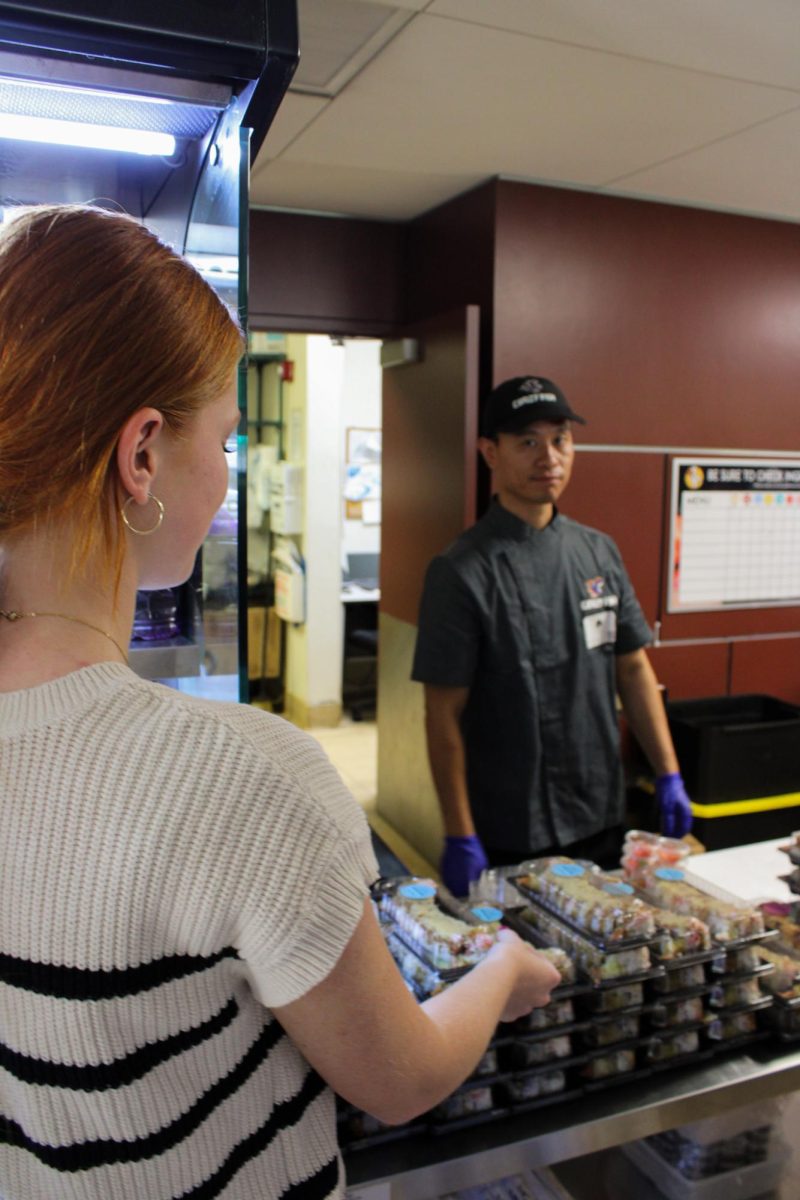It’s first period. The all-senior class is quietly watching an instructional video. An administrative staff member, camera in hand, slips into the classroom and takes photos of the class attentively watching the video. All are attentively watching except for one student—Sleepy—who is resting his head on his desk.
The staff member leaves. The video ends. The Instructor-Who-Shall-Not-Be-Named returns to the whiteboard to resume note-giving. But then, mid-thought, Instructor abruptly halts and, motioning at Sleepy, asks the class, “What is his name?” It is the second week of school, with new names and faces still being memorized. One of several seemingly puzzled students provides the name of the disengaged student. After hearing his name, Sleepy sits up at attention. He is about to get a wake-up call.
“Would you at least pretend like you want to be in this class?” Instructor asks Sleepy.
Sleepy doesn’t reply.
The classroom throbs with silence.
Instructor continues, “[Staff member] took that picture and you were sleeping in it. You don’t know where that picture will end up.”
Gulp.
“And hey, if you don’t want to be here, get out! Drop the class.”
There’s more.
Growing angrier with each word spoken, Instructor warns Sleepy, “You better wipe that damn smirk off your face!”
The unexpected profanity startles the class. This now seems to have gone too far, but it’s going to go farther.
“Are you done? If you need to step out for a moment and get a drink of water, then please do.” As Sleepy hadn’t expressed thirst nor demonstrated any sign of dehydration, this made no sense.
For the first time since the lambasting began, Sleepy responds, softly and respectfully. “I’m sorry. I’ll stop.”
But Instructor is insistent. “Go get a drink of water.”
“I’m fine. I’ll stop,” Sleepy replies.
“GO GET A DRINK OF WATER!” Instructor demands.
Sleepy calmly exits the classroom, and returns after a brief spell.
I witnessed this episode with Sleepy seated behind me, and having the good sense to remain face-forward as the tension began to rise in that classroom, I only observed Instructor’s demeanor during the confrontation that seemed endless, but was likely over in less than a minute. As it was unfolding I thought to myself, “Would the administration approve of the handling of this situation?”
If I was uncomfortable, I thought, my classmates must have been too, as we exchanged looks of unmistakable discomfort and concern.
The incident made me wonder, “What is the proper way to go about discipline according to the school?” I doubted that intimidation and taunting would be deemed acceptable. Bullying is unacceptable between students—is it acceptable coming from a teacher toward a student? “Decorum” is one of Upper School Principal Dennis Herron’s favorite talking points. Does the expectation of decorum at Trinity Prep apply equally to teachers when dealing with students about disciplinary issues? The answers turned out to be unequivocal and unambiguous.
Just as there is a Student Handbook detailing behavioral guidelines, there is a Faculty Handbook. Penned by Herron, Middle School Principal Jason Dowdy, Business Manager Steve Wennerstrom, and Headmaster Craig Maughan, it codifies behavioral expectations that are not specific to the classroom. Just as respect is expected of the students, teachers are expected to show respect for their students, including when it comes to discipline.
“[Teachers] are supposed to handle things that are challenging,” Maughan said. The incident between Sleepy and Instructor can certainly be qualified as “challenging.” Though Sleepy was disrespecting the material being taught, Maughan stated, “There is nothing to justify profanity toward a student.”
The concept of “community” is prevalent throughout the approach the school takes toward discipline. “When you belong to a community, you have responsibilities,” said College Counselor Stephanie Dryden. “We try to make the students aware of their impact on the community.”
Elaborating on the notion of community, Maughan explained, “Some less-disciplined students will lean toward the lower common denominator,” the lower common denominator being not paying attention in class. “When what the student does is disrespecting the institution, they shouldn’t be here,” Maughan continued, noting that Sleepy had done exactly that.
Sleepy infringed upon the opening statement of the “Student Behavior Expectations” section of the Student Handbook, which reads: “We expect Trinity Prep students to be responsible and considerate.” It’s not responsible to sleep in class and relinquish knowledge, and it’s not considerate of the rest of the class to disengage and possibly divert attention from the lesson, Maughan pointed out, but he didn’t condone the teacher’s response to Sleepy. “If I was notified [of such behavior], I would do something about it,” he said.
Upper School Dean of Students William Milsten is in charge of administering Level 1 consequences, which include all detentions and one-day suspensions. Milsten prefers for a teacher to speak to a student about an infraction before filling out a Discipline Report. “If a mystery write-up shows up in my office two days removed [from the incident], and there was no discussion with the teacher, nothing was solved,” he said.
In the interest of assuring the effectiveness of disciplinary action, Milsten prefers a one-on-one, discreet meeting with the student because it achieves the best results individually and for the school community. “I can write someone up for littering, but a conversation is much more effective,” he said.
Maughan elaborated on the point, saying, “Students do some poor things sometimes. They make bad judgments.” He pointed out that it’s the administration’s responsibility to make good judgments when it comes to unacceptable behavior by students. For this reason, the school does not enforce a “zero tolerance” policy.
According to the American Psychological Association, “[Zero tolerance policies] became widely adopted in schools in the early 1990s as a philosophy or policy that mandates that application of predetermined consequences, most often severe and punitive in nature, that are intended to be applied regardless of the gravity of behavior, mitigating circumstances, or situational context.” With such a blanket disciplinary policy commonly found in public schools, Maughan pointed out, “A student found with a Tylenol in his pocket would be expelled.” At Trinity Prep, gradation is applied to every serious misconduct issue that requires disciplinary action.
“We need to treat students for what they did,” Maughan explained.
However, consistency is paramount. “I hope,” said Herron, “the way students are treated is such that the students know we are making a decision based on consistency and care.”
For anything warranting Level 2 consequences, there is a deliberation process amongst the administrators to determine the appropriate punishment. Level 2 consequences include two or more days of suspension, disciplinary probation, and expulsion. Maughan said that the determination of Level 2 consequences is “a heavy responsibility. I don’t take it lightly.” Maughan and Herron said that making such impactful decisions is “stressful” because they need to make sure they have enough information to make a confident decision.
Even in instances where the offense is so serious that it will certainly mean an end to a student’s career at Trinity, careful consideration is given to the circumstances. That consideration extends to how a student reacts when confronted with evidence of a misdeed. There is always a measure of redemption to be gained by taking responsibility for one’s actions. As Maughan put it, “They’re still going to have a consequence, but honesty is valued and can determine gradation.” And therein lies a cautionary tale for every student.
Consider the scenario in which a student has violated the Honor Code and also has direct knowledge of another student having done so as well. Considering that the first pledge in the Honor Code is, “I will maintain my self-respect,” can a student justify covering for a fellow student as actually upholding the Honor Code—maintaing their self-respect—by not betraying a friend?
The Student Handbook reads, “Breaches of the Honor Code are classified as infractions or violations based upon the severity and circumstances of the incident.” Infractions consist of “most first-time breaches…depending upon the circumstances of the incident.” Violations are described as “a second infraction or a very serious or willful breach of the Honor Code.” What, in real-life circumstances, does this mean?
Middle School Principal Jason Dowdy acknowledged the suggestion of contradiction. “You’re in the position to uphold an idea, but you have to be concerned with yourself and your buddy,” he said. “It creates tension within a student.”
Dowdy also pointed to an idea Maughan had presented: that complicit bystanders are responsible for many inappropriate behaviors continuing. Dowdy said it’s a matter of what is currently acceptable and what remains acceptable. “If people get a reaction of ‘that’s not acceptable,’ that behavior is going to change.” Right now it’s acceptable to not challenge certain behaviors, and to remain silent for the sake of a relationship, Dowdy noted. And so students are caught between a rock and a hard place: do you take responsibility for turning in a friend or take responsibility for allowing potentially harmful behavior to continue? It poses a dilemma.
From the moment students set foot on campus, the Honor Code is ingrained into their minds as the foremost guideline for one’s character and conduct as a Trinity Student. “Lying, cheating, stealing, or tolerating anyone who does” are the guiding principles of what not to do. Mindful that this code of conduct provides an opportunity to teach by example, its tenets subject to interpretation in every instance, the school approaches its enforcement with care.
A 12th grader described his recent experience in the school’s discipline system as the result of an Honor Code violation— plagiarism on a past-due assignment. “I was taking the easy way out,” he conceded.
The student described the teacher’s handling of the situation as professional and respectful.
“He was very calm,” the student said. “He asked me to stay after class and he talked to me about what I had done and that it would have been better to turn in a [poor] assignment that was my own.”
Aside from a few dress-code infractions, the student was a first-time violator. He thought there was a “slim chance” that he would get away with the misrepresentation. When the teacher confronted him about the assignment using the Turnitin.com originality report, the student took responsibility for his actions. “I immediately admitted it,” he said.
At the ensuing meeting with Herron regarding the student’s misconduct, “[Herron] was very direct. He said that my honesty impacted the punishment, and he explained to me how certain things are very serious at the school,” said the senior. “It was actually a short conversation.”
The student’s offense was met with Level 1 consequences because he took responsibility for his actions. He received an in-school suspension, the lesser of the possible punishments.
No voices were raised. No assumptions were made. No knees were jerked. The 12th grader described the process as being very fair, and respectful, and thought respect had been “the goal of the interaction.”
The lesson was learned. “You’ve gotta be straightforward and honest, otherwise you deserve worse punishment,” the student said. He knew that what he had done was wrong and that there was no justification
for his actions. He glumly noted, “It was one of those mistakes you don’t make twice.”
A higher standard is held for upperclassmen, who know what is expected of them behaviorally and academically. Dowdy takes into consideration the developmental stage that middle-school students are still navigating in the lower grades. “There is a role to play in how kids become adults,” said Dowdy. “You’re teaching kids a lesson about how to act later in life.” He pointed out that students of any age should have the opportunity to redeem themselves. “You can move forward,” he said. “To say that you’re not ever going to make a mistake is wrong.”
That we’re all human, error-prone and deserving of forgiveness, is a central principle throughout the administration and the school.
Noting that it’s never acceptable for a teacher to shout at a class, Dowdy said it can be justified when emotions run high. But, it’s the teacher’s responsibility to not be pushed to the brink by a student. As he put it, “They can’t get your goat if they don’t know where you tied it up.”
“A lot of kids forget that we are human,” said Milsten. “I get my feelings hurt all the time by students.” He told of putting several hours into the preparation of a lesson on the music of the Enlightenment for his AP World History class, and during the lesson a student told him, “This is stupid.”
Ouch.
Student behavior is the product of family life, expectations, and the events of a given day. It’s no different for teachers. But because they’re adults, teachers are held to a higher standard of managing their emotions and respecting boundaries in the classroom. While students and teachers alike are vulnerable to succumbing to the stresses of their private lives, home life mustn’t intrude in the classroom. “When I have a bad day at home, that has to go away when I walk into the classroom,” said photography teacher and yearbook advisor Ryan Bowden. However, there is one exception to his rule. Although he separates most of his personal life from his job, Bowden said he treats his class just as he would his own child when it comes to discipline. “A warning with a ‘countdown’ does the trick 99 percent of the time,” he said.
Instructor is not convinced that whether or not a teacher has children informs a teacher’s approach to classroom discipline, and compares creating an atmosphere of order and respect in the classroom to dog training.
Yes, dog training.
“If you ask a student to do something, you must follow through,” Instructor asserted. “It’s like training a dog: The dog will never obey you if you give empty commands.”
Regarding the Sleepy incident, Instructor defended how it was approached. “I handled it well,” Instructor said, “the best way for that situation.”
When retelling the events of that morning, Instructor included that a prior request was made to Sleepy to not put his head down, and that the aggressive confrontation was in response to Sleepy’s display of willfull disrespect by doing, again, something for which he had been reprimanded earlier in class that day. (Sleepy didn’t recall having been admonished for dozing off earlier in the class. Another student present during the confrontation said that a request was not made by Instructor prior to the tongue-lashing.)
For Instructor though, it was also about establishing who was the Alpha Dog in this classroom. “When the student smirked as if gleeful that he had ‘defied’ my request, he had upped the ante,” said Instructor. “Again, I had to respond. Requesting that he go outside, get a drink of water, compose himself for learning and then return, was my response. I must say that since that bit of tug-of-war, the student has been much better behaved.”
Sleepy concurs, “I don’t sleep in class anymore.”
Other students in the class got the message as well. One classmate of Sleepy’s said, “I’m sure glad I was taking notes.”
“He deserved it,” said another.
While the tact taken with Sleepy set a precedent in the class for what awaits a student who overtly or more subtly disses Instructor, and it had the desired effect, it was not appropriate by the school’s standards.
The administration stands behind the job they are doing to uphold the school’s mission. Preserving the Trinity family and preparing students for life after high school are always at the forefront of the process when a crucial decision is being made.
“At the end of the day, your actions are important; they carry weight,” said Dowdy. “We create the world we live in as a group.” Dowdy is also confident in the school’s consistency, saying that he has never walked away from a dense discipline scenario second-guessing the outcome.
Herron said that while he “makes decisions every day that people don’t agree with,” he believes in the system on which the school operates after being part of it for 17 years.
“I think we do a pretty good job of determining circumstances,” he said.
“We have to counsel people to start with or discipline them later,” said Maughan. In a perfect world, consequences would never be administered because situations warranting them wouldn’t arise. Recognizing that such perfection is unattainable, Maughan is confident that progress can be made. “We have to establish a culture and expect teachers and students to do the right thing,” said the headmaster, adding, “When they do, that’s a pretty good place.”
For now the administration can only do so much. It’s up to the students and teachers to bring about real change, something not eagerly embraced by all.
The exploration of discipline received mixed responses. Each administrator asked to comment agreed, as did each teacher.
The students asked to comment did not all respond positively. While some agreed to talk, others discouraged this writer from reporting on the matter and would not speak to me on the record. They said they didn’t wan’t any teachers to become angry with them, and they didn’t want to shed light on any dark areas in the classroom. One student who would only tell me that he recently experienced a discipline issue emphatically declined to comment.
Our collective silence allows misbehavior, be it cheating, substance abuse, bullying, or myriad other offenses by students and teachers to continue.
While discipline may seem out of our hands as students, we can be a meaningful force for change. Though we may not always feel safe speaking out at school, we should not hesitate to speak up.
Trinity strives to provide a safe environment, and encourages us to speak up.












